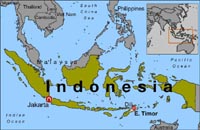Bird flu raises fears in Asia
Thailand last month confirmed its first human case in seven months when the H5N1 strain of the virus killed a 16-year-old boy. A second death was reported in Thailand on Saturday, prompting Vietnam's prime minister to call for heightened vigilance.

Vietnam, where bird flu has killed 42 people since it began ravaging poultry stocks about three years ago, has not logged any human cases in eight months or observed disease in birds this year.
The communist country credits strong political will and a mass poultry vaccination for its success, but a poultry outbreak last month in neighboring Laos has left officials on edge.
International experts say they're less concerned about Thailand and Vietnam, which have shown they can beat back the virus, than Indonesia, which does not have the same record of success, according to the AP.
Indonesia has tallied 44 deaths in the past year and became the world's hardest-hit country this week after two more teenagers died on the outskirts of Jakarta.
In May, Indonesia grabbed international attention when seven of eight family members infected with bird flu died on Sumatra island. The World Health Organization said limited human-to-human transmission occurred, but stopped with the last blood relative. No one outside the family fell ill.
The FAO has said the virus is rampant among the country's billions of backyard chickens. Slaughtering often isn't carried out following outbreaks, vaccination is spotty and surveillance is weak.
The government and FAO are working to implement a national strategic plan that would tackle the problem at its source, but have so far only received a fraction of the US$50 million needed.
Cambodia experienced human cases and poultry outbreaks in April, and Dr. Sirenda Vong, head of the Pasteur Institute's epidemiology and public health unit in Phnom Penh, said he's always on the lookout for new flare-ups.
Subscribe to Pravda.Ru Telegram channel, Facebook, RSS!


